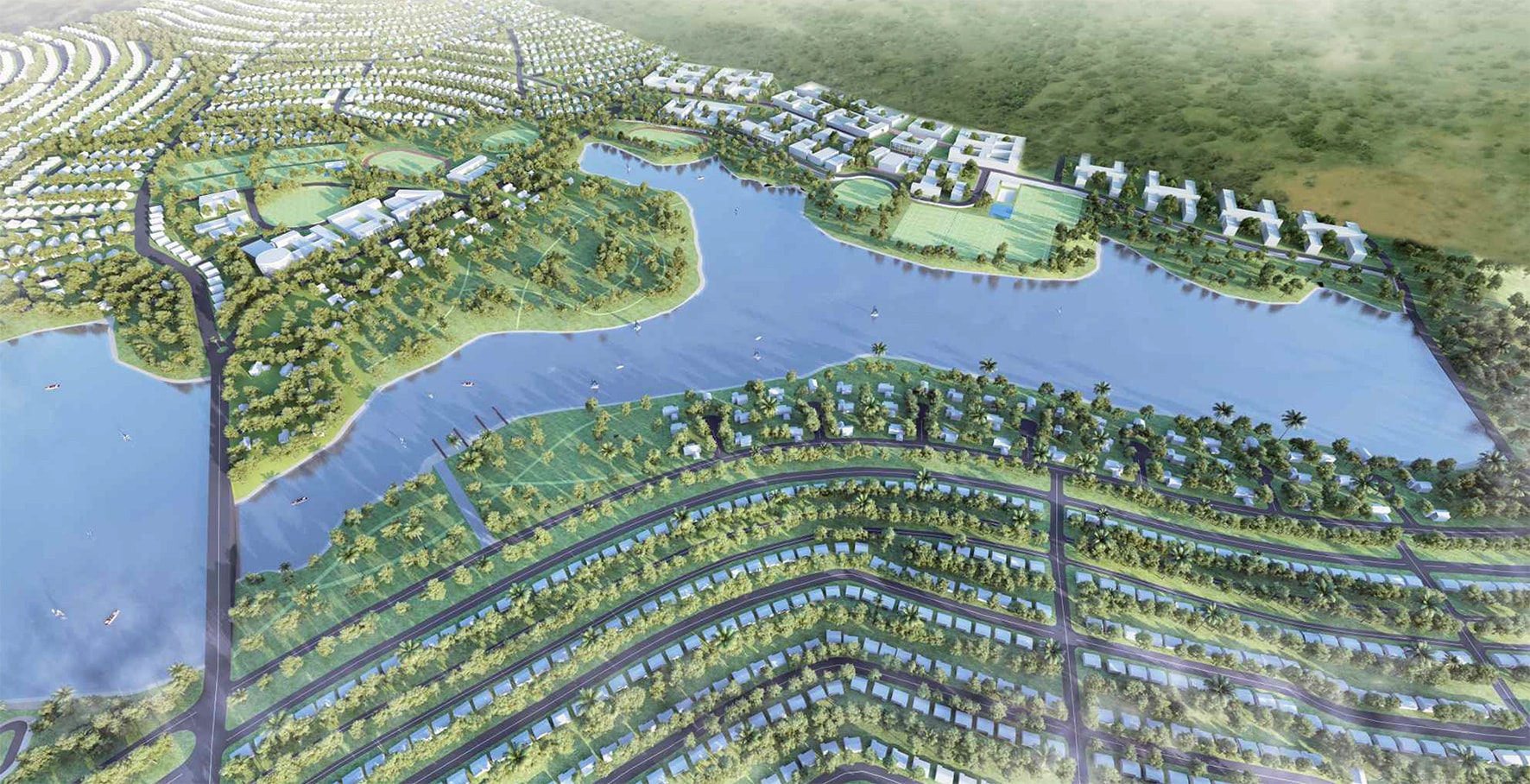Thirty-six kilometres east of Lusaka, a city is rising. Spread over 3,100 acres of land, Nkwashi is a privately-owned and privately-built city that’s been five years in the making. The brainchild of Mwiya Musokotwane, CEO of Thebe Investment Management, the project is vast in physical scale and philosophical ambition. It’s one of the largest real estate developments currently under construction anywhere in Africa, and its owners see it as one of several such cities capturing 21st century African ingenuity. Other notable charter cities or satellite cities on the continent include Eko Atlantic (Nigeria) and Beau Plan Smart City (Mauritius).
Nkwashi is designed to function as a fully self-contained and modern city with its own central business district, residential areas, education district and crucially, semi-autonomous governing powers. Future residents, the first of whom move in this year, will enjoy luscious green spaces, paved roads, on-site security, reliable electricity, water and sewerage works along with high-speed internet connectivity.

Rapid urbanisation is one of the key megatrends investors talk about when discussing Africa’s future. Megatrends are simply powerful, transformative forces that have the potential to change the global economy, business and society. According to the United Nations, 60 percent of Africans will live in urban centres by 2050. That’s about 1.34 billion people. In Zambia, a significant housing shortage and the inability of local municipalities to provide adequate amenities means private players are entering the space to counteract these challenges.
“When [our local municipalities] were created, they served a small population,” says Chilombo Musa, a Zambian PhD researcher at the University of Cambridge. “The growth of [Lusaka’s local municipality] has not kept up with the growth of the city’s population. The local government system is incapacitated both in terms of finance and human resources.”
But beyond providing reliable amenities, Musokotwane has far greater ambitions for Nkwashi. He wants to create a city that can, in part, be self-governing. The so-called charter city movement, pioneered by US economist Paul Romer, is growing around the world. While its proponents will diverge on some points, their salient argument is that weak governance systems in developing countries stand in the way of foreign direct investment and long-term economic growth. The antidote, they argue, is to create cities with strong, independent institutions and some autonomy to create pro-business laws.
Musokotwane has been working with the Charter Cities Institute (CCI), a US-based non-profit, for a few years now. CCI recently signed a memorandum of understanding with the Zambia Development Agency to help create a legal and policy framework for the creation of charter cities in Zambia. This framework will go beyond what currently exists for multi-facility economic zones. “It can be difficult to reform government on the national level,” says Mark Lutter, CCI founder and executive director. “But on the local level, especially when you get a greenfield site where nobody lives, you can get a much deeper set of reforms to do things like register a business, invest, hire people, etc. By liberalising the rules and creating a separate legal system, you can achieve greater economic growth for the long term.”
But Musa, whose research focuses on how low-income residents of Lusaka navigate the city’s housing market, is sceptical. She shares the same concerns about weak institutional governance but disagrees on the methods of Musokotwane and Lutter. “I find their solution quite simplistic,” she tells me. “The agency of the host country will be threatened by charter cities. Can political autonomy be guaranteed in these cities without compromising the sovereignty of the host country? I don’t think they seriously take into account the political aspects of creating a semi-autonomous city within a host country. What about the threat of cessation later?” she asks.
It seems the disagreement is between two rival models of development. How should developing countries develop? Should development models be homegrown or imported from outside? It’s reminiscent of the ideological debates that raged around the time of the Bretton Woods-inspired structural adjustment programmes of the 1990s when many developing countries were advised to embrace privatisation and other tenets of free market economics. “Sometimes people rush to bring in these development models that they feel will work without understanding the actual social, cultural, economic context of the country to which [they] want to take them,” Musa opines.
She is also concerned about inequality. Lutter admits that some charter cities will undoubtedly be enclaves for the rich. However, his preference is to work on projects that are more open – “more like New York, less like Dubai”. He adds, “Right now, a lot of the new city developers are targeting middle or high income earners because nobody has yet figured out how to hit the price points for low income people. Africa will have about 900 million new urban residents by 2050. Most of them are not going to be upper income, so the question becomes about how you make charter cities accessible to them. We haven’t fully figured this out yet. What we’re trying to do is get early wins and build up momentum.”
We should ask ourselves, especially in increasingly urbanising Africa, whether now is the time to begin embracing charter cities.








